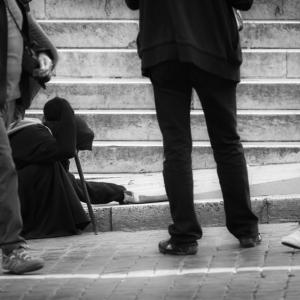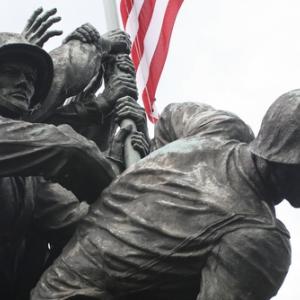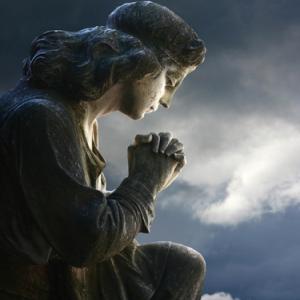David O’Hara is a professor in the department of Religion, Philosophy, and Classics at Augustana College, an ELCA Lutheran college in South Dakota, where he directs the philosophy program. He is the author of several books, including a book on C.S. Lewis' environmental vision. His most recent book, Downstream, is about faith, ecology, and fly-fishing for brook trout. O’Hara also contributes to the Chronicle of Higher Education and blogs here.
Posts By This Author
When We Choose to See Them
“Excuse me, sir. I don’t have any cash, but I have a credit card, and I’m going to that restaurant right now. If you’re hungry, I’d be happy to have you join me.”
Well, I said something like that, though my French was a little rusty, and I might not have said it quite right.
The man was sitting on the sidewalk outside the train station. I’d just arrived in Paris after an overnight ride, and I was tired and hungry. The sign he was holding caught my eye: “I’m an out-of-work architect, and I need money for rent for my son and me.”
You just never know with panhandlers and street beggars. Are they telling the truth, or have they simply figured out how to pull our heartstrings? It’s easy to choose to ignore them, or to toss them some cash and pay off a guilty conscience. Don’t stop, just toss some coins and keep rolling on by. I was living in Madrid at the time, a city of five million people. Beggars are a daily fact of life in a city like that, and you need to find a way to deal with them. Eventually they become like busy intersections, crosswalks, gawking tourists, and all the other impediments to travel.
At the same time, I couldn’t help asking what Christ would do.
Not The Weapons But What They Defend
I wish that we, as a people, would speak better words to those who have served in our wars. I fear that we do them, and ourselves, a disservice when we call them all heroes without letting them decide which deeds were heroic and which should be left unspoken. When we call everyone who wears a uniform a hero, we diminish heroism everywhere.
I don’t mean we should refrain from thanking those who serve. If anything, we should thank them far more than we do, and our thanks should not just be in words. Our thanks should be sincere and long-lasting, and expressed in things like the best military hospitals we can afford, the best education we can provide, and our best efforts to ensure that their generation will be the last to endure what they have endured. Even if those ideals prove to be unattainable, we should not let that stop us from trying to attain them. As the Talmud says, “It is not your job to finish the work, but you are not free to walk away from it.”
What We Need Right Now
Any right-thinking stranger on our shores must read our daily news and think our nation has gone mad. We have cultivated the ability to end lives quickly; and yet we are continually surprised when our fellow citizens use the tools we have devised for exactly the purpose for which we invented them. Come to think of it, I think we’ve gone mad, too.
But our madness is not one that can be cured by laws alone. Laws can help to restrain us, and can help by making it a little less easy for us to find ourselves armed for murder. But we need something more, something that churches are better equipped to offer than legislatures are.
What we need right now is a richer moral imagination. We need better stories to tell ourselves, stories about the kind of people we could be. We need, more than anything, to learn to help one another to do the hard work of choosing not to pull the trigger.
What Jesus Didn't Say
In the fourth chapter of John’s Gospel Jesus speaks with a woman when they find themselves alone at a well at midday. We can learn a lot from what he says to her, and from what he chooses not to say.
Jesus tells the woman, “Go, get your husband, and bring him here.” She replies, “I have no husband.” Jesus tells her “That’s right. You’ve had five husbands, and the man you’re now with isn’t your husband.”
These could have been shaming words. In her culture, to be without a husband is to risk economic ruin, and to have been divorced by your husband is to be shamed.
Had he wanted to, Jesus could have scored some serious points here: I’m a prophet, and you’re a sinner. I’m celibate, and you’re promiscuous. You are living in sin by living with a man who is not your husband.
Evidently, he didn’t want to say those things.
Don't Worship the Monsters
I’m not offering this as consolation to those who have lost someone they love, but as a warning. What’s true of those we love may be just as true of those whom we hate and fear: we become like what we worship, and we worship what we cherish in our hearts.
When people commit monstrous deeds, it is hard not to turn and stare in horror. Think about how hard it is to pull your eyes from the television even when none of the news is new, just the same breathless commentary about what we don’t yet know, what we still don’t understand about the latest act of terror.
When the monsters and their violence become our focus, they grow and become our gods. We’ve become very good at hurting one another, so of course we need to be vigilant. But it’s possible to take our fear too far, to let our natural reaction to sudden violence become a permanent policy of suspicion and terror. Then we are in danger of worshiping our would-be enemies. We don’t worship them joyfully, but we worship them anyway, the way we might worship any vengeful, unstable, wrathful gods: looking over our shoulders and fearing their power. If the best we can come up with is invective against immigrants, suspicion of people unlike us, and perpetually heightened security measures, it starts to look like our hearts are full of fear.




